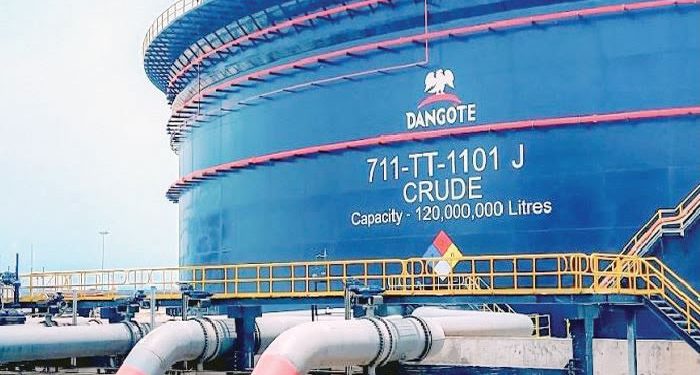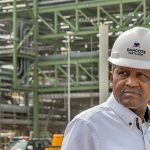Dangote Petroleum Refinery has reaffirmed its commitment to ensuring a steady and uninterrupted supply of petrol and diesel across Nigeria, even as the Federal Government’s newly approved 15% import duty on petroleum products continues to stir debate among stakeholders.
The refinery, which currently delivers over 45 million litres of Premium Motor Spirit (PMS) and 25 million litres of Automotive Gas Oil (diesel) daily, said its production already surpasses national demand, positioning it to meet the country’s energy needs without dependence on imports.
Group Chief Branding and Communications Officer of Dangote Industries Limited, Anthony Chiejina, said in Lagos that the company remains committed to supporting energy stability and strengthening consumer confidence through efficient local production.
“Our refinery is currently loading over 45 million litres of PMS and 25 million litres of diesel daily, which exceeds Nigeria’s demand,” he said. “We are working collaboratively with regulatory agencies and distribution partners to guarantee efficient nationwide delivery.”
Chiejina added that the refinery’s operations were contributing to stabilising the naira and improving energy security by reducing foreign exchange outflows tied to petroleum imports. He argued that the newly introduced 15% tariff on imported petrol and diesel was a welcome policy that would protect local industries, discourage dumping of substandard products, and encourage fresh investments in the downstream oil sector.
“Dumping destroyed our textile industry, which was once a major employer of labour and creator of wealth,” he said, warning that failure to protect local industries could expose the country to large-scale dumping from Asia and Europe.
Chiejina described the tariff as “a patriotic step” that would safeguard local production, stimulate employment, and strengthen the national economy. He praised President Bola Tinubu’s administration for what he called “visionary reforms” aimed at transforming Nigeria’s industrial base and ensuring long-term energy security.
According to him, “President Tinubu continues to embody courageous and visionary leadership, renewing the hope of Nigerians and restoring investor confidence in the nation’s economy.”
The Independent Petroleum Marketers Association of Nigeria (IPMAN) also downplayed fears that the new tariff would lead to fuel price increases. National President of IPMAN, Abubakar Maigandi, said there was “no cause for alarm,” stressing that the policy was intended to reduce import dependence and promote private refinery investments.
“I don’t think the increment will cause anything, because we are still selling at the same price since the news broke,” Maigandi told reporters. “The policy is to encourage investors to build and operate refineries in Nigeria instead of relying on importation.”
Head of Public Affairs at the Nigerian Midstream and Downstream Petroleum Regulatory Authority (NMDPRA), George Ene-Ita, disclosed that Nigeria currently imports about 64% of the 50 million litres of petrol consumed daily, while local production accounts for roughly 36%.
Under the new framework, the Federal Government is expected to earn import duties from about 32 million litres of imported fuel per day, potentially boosting revenue while protecting local producers.
However, the African Democratic Congress (ADC) has demanded an immediate reversal of the new 15% import duty, warning that the policy would worsen the cost-of-living crisis and push fuel prices beyond the reach of ordinary Nigerians.
In a statement by its National Publicity Secretary, Bolaji Abdullahi, the party described the tariff as “insensitive, ill-timed, and ill-conceived,” saying it could raise petrol prices above ₦1,000 per litre, a development that would hit farmers, transporters, and small business owners hardest.
“Economic growth that condemns the majority to poverty and misery is not progress, it is destruction,” the statement read. The ADC also criticised the government’s track record, pointing out that the Port Harcourt refinery, which was recently rehabilitated at a cost of $1.5 billion, had since collapsed, leading to a ₦366.2 billion loss.
The party accused the Tinubu administration of pursuing “trial-and-error economic policies” without providing social protection measures for struggling citizens. It maintained that while private investment in refining was necessary, policies designed to protect such investment should not come at the expense of the public.
“A government that cannot manage its refineries has no business taxing those who keep the nation running with their sweat and blood,” the party said, urging the President to prioritise stability, transparency, and empathy in economic decision-making.
Despite the controversy, data suggest that the operations of the Dangote Refinery have already begun to influence fuel prices positively. The average price of petrol dropped from about ₦1,030 per litre in September 2024 to between ₦841 and ₦851 in September 2025 following the implementation of the refinery’s Direct Delivery Scheme. Diesel prices, which ranged from ₦1,400 to ₦1,700 per litre a year earlier, have also fallen to an average of ₦1,020 per litre.
Dangote Industries President, Aliko Dangote, recently assured Nigerians that there would be no fuel scarcity or price hike during the festive season, promising a stable supply through Christmas and the New Year.
The 15% tariff remains one of the government’s most controversial fiscal measures this year — praised by local producers as a lifeline for industrial growth, yet criticised by opposition parties and small business advocates who fear it could raise operational costs and deepen inflationary pressures.
For now, the Dangote Refinery’s robust output offers some relief, but the long-term balance between protecting local production and ensuring affordability for Nigerian households and small businesses remains delicate.










